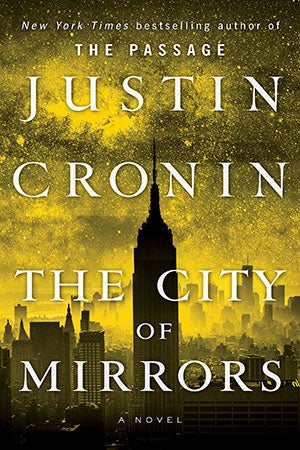The City of Mirrors: Excerpt
Rain was falling as Alicia approached the city. Seen from above in the soft morning light, the river was as she’d imagined it: wide, dark, ceaselessly flowing. Beyond it rose the spires of the city, dense as a forest. Ruined piers jutted from the banks; wrecks of ships were washed against the shoals. In a century, the waters had risen. The south end of the island looked fully submerged, waves lapping against the sides of the buildings, black as ink.
She picked her way north, hopscotching through the detritus, searching for a way across. The rain stopped, started, stopped again. It was late afternoon beneath a clear summer sky when she reached the bridge she’d been looking at for hours: two massive struts, like giant twins, holding the decks aloft with cables slung over their shoulders. The thought of crossing it filled Alicia with a profound anxiety she could not let herself show, though Soldier sensed it anyway, demonstrating his awareness with the smallest notch of reluctance in his gait. This again?
Yes, she thought. This.
She veered inland and located the ramp. The usual barricades, gun emplacements, military vehicles stripped bare by a hundred years of weather, many overturned or lying on their sides: there had been a battle here. The upper deck was choked with the carcasses of automobiles, painted white by the droppings of birds. Alicia dismounted and led Soldier through the wreckage. Crossing the bridge was not as bad as she feared; she had only to keep her eyes forward, to put one foot in front of the next, to hold her apprehension at bay.
Mid-span they came to a place where the roadway had collapsed. Cars lay in a twisted heap on the deck below. A narrow ledge along the guardrail, four feet wide at the most, presented the only viable pathway.
“No big deal,” Alicia said to Soldier. “Nothing to it.” The height was irrelevant; it was the water that stoked her fear. The feeling was automatic, like an allergy, a sneeze barely held in abeyance. Beyond the edge lay a swallowing maw of death. The river was bad enough; the thought of the ocean, had she indulged it, would have paralyzed her completely. Step by step, gelid with dread, she led Soldier across. How strange, she thought, to fear nothing but this.
The sun was behind them when they reached the far side. The first ramp was impassable, but the second guided them to street level, into in an area of what appeared to be warehouses and factories. She headed south, along the backbone of the island; she had no map but didn’t need one. The numbered streets ticket down. Eventually the factories gave way to blocks of apartments and brownstones, interspersed with vacant lots, some barren, others like miniature jungles. In some places the streets were flooded, dirty river water bubbling up through the manholes. Never had Alicia been in such a place, nor even imagined one like it. The island’s sheer density astounded her. She was aware of the tiniest sounds and movements: pigeons cooing, rats scurrying, water dripping down the walls of the buildings’ interiors. The acrid spore-smell of mold. The funk of rot. The stench of the city itself, death’s temple.
Evening came on. Bats began to flitter in the sky. She was on Lennox Avenue, in the 110s, when a wall of vegetation rose in her path. At the heart of the abandoned city, a woodland had taken root, flowering to massive dimensions. At its edge she brought Solider to a halt and tuned her thoughts to the trees; when the virals came, they came from above. It wasn’t her they’d want, of course; Alicia was one of them. But there was Soldier to consider. She allowed a few minutes to go by, and when she was satisfied that they would pass in safety, tapped her heels to his flanks.
“Let’s go.”
Just like that, the city vanished. They could have been in the mightiest of ancient forests. Night had fallen in full, lit by a waning rind of moon. They came to a wide field of feathered grass tall enough to swish against her thighs, then the trees re-staked their claim upon the land.
They emerged up a flight of stone steps onto 59th Street. Here the buildings had names. Helmsley Park Lane. Essex House. The Ritz Carleton. The Plaza. She jogged east to Park Avenue and headed south again. The buildings grew taller, towering above the roadway; the street numbers continued their relentless decline. Fifty-sixth. Fifty-first. Forty-eighth. Forty-third.
Forty-second.
She dismounted. The building was like a fortress. No, she thought, a castle, fit for a king. High arched windows gazed darkly upon the street; along the roofline, at the center of the facade, a stone figure stood with his arms outstretched in welcome. Beneath this, etched into the building’s face, chiseled in moonlight were the words: GRAND CENTRAL TERMINAL.
Alicia, I’m here. Lish, I’m so glad that you have come.
Excerpted from The City of Mirrors (Book Three of The Passage Trilogy) by Justin Cronin Copyright © 2016 by Justin Cronin. Excerpted by permission of Ballantine Books. All rights reserved. No part of this excerpt may be reproduced or reprinted without permission in writing from the publisher.
Praise
“Justin Cronin’s Passage trilogy is remarkable for the unremitting drive of its narrative, for the breathtaking sweep of its imagined future, and for the clear lucidity of its language. The City of Mirrors is a thrilling finale to a trilogy that will stand as one of the great achievements in American fantasy fiction.”—Stephen King
“Readers who have been patiently awaiting the conclusion to Cronin’s sweeping post apocalyptic trilogy are richly rewarded with this epic, heart-wrenching novel… a thrilling and satisfying conclusion.” –Library Journal, starred review

